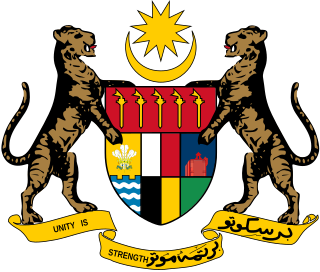An allegiance is a duty of fidelity said to be owed, or freely committed, by the people, subjects or citizens to their state or sovereign.

The term "British subject" has several different meanings depending on the time period. Before 1949, it referred to almost all subjects of the British Empire. Between 1949 and 1983, the term was synonymous with Commonwealth citizen. Currently, it refers to people possessing a class of British nationality largely granted under limited circumstances to those connected with Ireland or British India born before 1949. Individuals with this nationality are British nationals and Commonwealth citizens, but not British citizens.

Indian nationality law details the conditions by which a person holds Indian nationality. The two primary pieces of legislation governing these requirements are the Constitution of India and the Citizenship Act, 1955.
In law, an alien is any person who is not a citizen or a national of a specific country, although definitions and terminology differ to some degree depending upon the continent or region. More generally, however, the term "alien" is perceived as synonymous with foreign national.

South African nationality law details the conditions by which a person is a national of South Africa. The primary law governing nationality requirements is the South African Citizenship Act, 1995, which came into force on 6 October 1995.

Australian nationality law details the conditions by which a person is a national of Australia. The primary law governing nationality regulations is the Australian Citizenship Act 2007, which came into force on 1 July 2007 and is applicable in all states and territories of Australia.

New Zealand nationality law details the conditions by which a person is a national of New Zealand. The primary law governing these requirements is the Citizenship Act 1977, which came into force on 1 January 1978. Regulations apply to the entire Realm of New Zealand, which includes the country of New Zealand itself, the Cook Islands, Niue, Tokelau, and the Ross Dependency.

The primary law governing nationality of the Republic of Ireland is the Irish Nationality and Citizenship Act, 1956, which came into force on 17 July 1956. Ireland is a member state of the European Union (EU) and all Irish nationals are EU citizens. They are entitled to free movement rights in EU and European Free Trade Association (EFTA) countries and may vote in elections to the European Parliament.

This article concerns the history of British nationality law.

Malaysian nationality law details the conditions by which a person is a national of Malaysia. The primary law governing nationality requirements is the Constitution of Malaysia, which came into force on 27 August 1957.

Singapore nationality law details the conditions by which a person holds Singapore nationality. The primary law governing nationality requirements is the Constitution of Singapore, which came into force on 9 August 1965.

The primary law governing nationality in the United Kingdom is the British Nationality Act 1981, which came into force on 1 January 1983. Regulations apply to the British Islands, which include the UK itself and the Crown dependencies, and the 14 British Overseas Territories.

Pakistani nationality law details the conditions by which a person is a national of Pakistan. The primary law governing these requirements is the Pakistan Citizenship Act, 1951, which came into force on 13 April 1951.

Tanzanian nationality law is regulated by the Constitution of Tanzania, as amended; the Tanzania Citizenship Act, and its revisions; and various international agreements to which the country is a signatory. These laws determine who is, or is eligible to be, a national of Tanzania. The legal means to acquire nationality, formal legal membership in a nation, differ from the domestic relationship of rights and obligations between a national and the nation, known as citizenship. Nationality describes the relationship of an individual to the state under international law, whereas citizenship is the domestic relationship of an individual within the nation. Commonwealth countries, including Tanzania, often use the terms nationality and citizenship as synonyms, despite recognising their legal distinction and the fact that they are regulated by different governmental administrative bodies. For much of Tanzania's history racist policy curtailed domestic rights and nationality. Tanzanian nationality is typically obtained under the principle of jus soli, i.e. by birth in the territory, or jus sanguinis, i.e. by birth in Tanzania or abroad to parents with Tanzanian nationality. It can be granted to persons with an affiliation to the country, or to a permanent resident who has lived in the country for a given period of time through naturalisation.

Ghanaian nationality law is regulated by the Constitution of Ghana, as amended; the Ghana Citizenship Act, and its revisions; and various international agreements to which the country is a signatory. These laws determine who is, or is eligible to be, a national of Ghana. The legal means to acquire nationality, formal legal membership in a nation, differ from the domestic relationship of rights and obligations between a national and the nation, known as citizenship. Nationality describes the relationship of an individual to the state under international law, whereas citizenship is the domestic relationship of an individual within the nation. Ghanaian nationality is typically obtained under the principle of jus sanguinis, born to parents with Ghanaian nationality. It can be granted to persons with an affiliation to the country, or to a permanent resident who has lived in the country for a given period of time through naturalization.

Eswatini nationality law is regulated by the Constitution of Eswatini, as amended; the Swaziland Citizenship Act, and its revisions; and various international agreements to which the country is a signatory. These laws determine who is, or is eligible to be, a national of Eswatini. The legal means to acquire nationality, formal legal membership in a nation, differ from the domestic relationship of rights and obligations between a national and the nation, known as citizenship. Nationality describes the relationship of an individual to the state under international law, whereas citizenship is the domestic relationship of an individual within the nation. Eswatini nationality is typically obtained under the principle of jus soli, i.e. by birth in Eswatini, or jus sanguinis, born to parents with Eswatini nationality. It can be granted to persons with an affiliation to the country, or to a permanent resident who has lived in the country for a given period of time through naturalisation or the traditional khonta system.

Gambian nationality law is regulated by the Constitution of The Gambia, as amended; The Gambia Nationality and Citizenship Act, and its revisions; and various international agreements to which the country is a signatory. These laws determine who is, or is eligible to be, a national of The Gambia. The legal means to acquire nationality, formal legal membership in a nation, differ from the domestic relationship of rights and obligations between a national and the nation, known as citizenship. Nationality describes the relationship of an individual to the state under international law, whereas citizenship is the domestic relationship of an individual within the nation. Gambian nationality is typically obtained under the principle of jus sanguinis, born to parents with Gambian nationality. It can be granted to persons with an affiliation to the country, or to a permanent resident who has lived in the country for a given period of time through naturalisation.

Malawian nationality law is regulated by the Constitution of Malawi, as amended; the Malawian Citizenship Act, and its revisions; and various international agreements to which the country is a signatory. These laws determine who is, or is eligible to be, a national of Malawi. The legal means to acquire nationality, formal legal membership in a nation, differ from the domestic relationship of rights and obligations between a national and the nation, known as citizenship. Nationality describes the relationship of an individual to the state under international law, whereas citizenship is the domestic relationship of an individual and the nation. Malawian nationality is typically obtained under the principle of jus soli, i.e. by birth in Malawi, or jus sanguinis, born to a father with Malawian nationality. It can be granted to persons with an affiliation to the country, or to a permanent resident who has lived in the country for a given period of time through naturalisation.

Zambian nationality law is regulated by the Constitution of Zambia, as amended; the Citizenship of Zambia Act; and various international agreements to which the country is a signatory. These laws determine who is, or is eligible to be, a national of Zambia. The legal means to acquire nationality, formal legal membership in a nation, differ from the domestic relationship of rights and obligations between a national and the nation, known as citizenship. Nationality describes the relationship of an individual to the state under international law, whereas citizenship is the domestic relationship of an individual within the nation. Commonwealth countries often use the terms nationality and citizenship as synonyms, despite their legal distinction and the fact that they are regulated by different governmental administrative bodies. Zambian nationality is typically obtained under the principals of jus soli, i.e. birth in Zambia, or jus sanguinis, i.e. by birth to parents with Zambian nationality. It can be granted to persons with an affiliation to the country, or to a permanent resident who has lived in the country for a given period of time through registration.

Zimbabwean nationality law is regulated by the Constitution of Zimbabwe, as amended; the Citizenship of Zimbabwe Act, and its revisions; and various international agreements to which the country is a signatory. These laws determine who is, or is eligible to be, a Zimbabwean national. The legal means to acquire nationality, formal legal membership in a nation, differ from the domestic relationship of rights and obligations between a national and the nation, known as citizenship. Nationality describes the relationship of an individual to the state under international law, whereas citizenship is the domestic relationship of an individual within the nation. Commonwealth countries often use the terms nationality and citizenship as synonyms, despite their legal distinction and the fact that they are regulated by different governmental administrative bodies. Zimbabwean nationality is typically obtained under the principal of jus sanguinis, i.e. by birth to parents with Zimbabwean nationality. It can be granted to persons with an affiliation to the country, or to a permanent resident who has lived in the country for a given period of time through registration, a process known elsewhere as naturalisation.
















